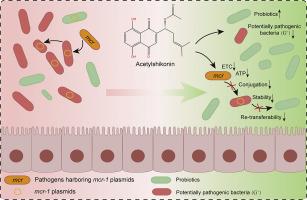Acetylshikonin regulates the gut microbiota and inhibits the horizontal transmission of colistin-resistant plasmids
IF 8.3
1区 医学
Q1 CHEMISTRY, MEDICINAL
引用次数: 0
Abstract
Background
The gut microbiota serves as a major reservoir for antibiotic resistance genes (ARGs), driving the spread of antimicrobial resistance (AMR) via horizontal gene transfer (HGT). Acetylshikonin (ASK), a naphthoquinone derived from the medicinal plant Lithospermum erythrorhizon, was proved to inhibit plasmid conjugation in vitro and in vivo. However, its impact on gut microbiota composition and precise HGT inhibition process within complex gut microbiota community remains unexplored.
Purpose
This study aims to clarify the precise inhibition effect of ASK on the transfer process of colistin-resistant plasmid in gut microbiota and its mechanisms.
Methods
High-throughput cell sorting and 16S rRNA gene amplicon sequencing were employed to assess the precise gut microbiota species that ASK inhibited the resistant plasmid transfer to. The plasmid stability and re-transferability of transconjugants was evaluated by passaging culture and in vitro conjugative assay. The biochemical impact of ASK on donor cell and gut microbiota were tested by fluorescence assay and ELISA.
Results
ASK changed the gut microbiota composition by enriching probiotics and reducing Gram-positive bacteria. In addition, ASK effectively inhibited the conjugative transfer of colistin-resistant plasmids to Proteobacteria (Escherichia and Ligilactobacillus) within the gut community. Furthermore, ASK weakened the stability and re-transferability of transconjugants, thereby limiting ARG further dissemination in gut. Moreover, ASK inhibited the electronic transport chain (ETC) and suppressed the ATP supply for both donor cells and the gut microbiota. Thus the plasmid conjugation processing in gut microbiota was inhibited by ASK.
Conclusion
This study demonstrated that ASK restructured gut microbiota and disarmed plasmid-mediated resistance spreading, offering a dual-targeted strategy against antimicrobial resistance.

乙酰紫草素调节肠道微生物群,抑制粘菌素抗性质粒的水平传播
肠道微生物群是抗生素耐药基因(ARGs)的主要储存库,通过水平基因转移(HGT)驱动抗菌素耐药性(AMR)的传播。乙酰紫草素(Acetylshikonin, ASK)是一种从药用植物紫草中提取的萘醌类化合物,体外和体内均有抑制质粒结合的作用。然而,其对肠道菌群组成的影响以及复杂肠道菌群中HGT的精确抑制过程仍未被探索。目的:本研究旨在阐明ASK对粘菌素耐药质粒在肠道菌群中的转移过程的精确抑制作用及其机制。方法采用高通量细胞分选和16S rRNA基因扩增子测序技术,精确评估asq抑制耐药质粒转移的肠道菌群。通过传代培养和体外偶联实验评价了质粒的稳定性和转偶联物的再转移性。采用荧光法和酶联免疫吸附法检测asc对供体细胞和肠道微生物群的生化影响。结果通过增加益生菌,减少革兰氏阳性菌,改变肠道菌群组成。此外,ASK有效地抑制了耐粘菌素质粒与肠道内变形菌(埃希氏菌和脂乳杆菌)的结合转移。此外,ASK削弱了转缀合物的稳定性和再转移性,从而限制了ARG在肠道中的进一步传播。此外,ASK抑制了电子传递链(ETC)并抑制了供体细胞和肠道微生物群的ATP供应。由此可见,ASK抑制了肠道菌群中的质粒偶联加工。结论本研究表明,ASK重组了肠道菌群和解除了质粒介导的耐药性传播,提供了一种抗微生物药物耐药性的双靶向策略。
本文章由计算机程序翻译,如有差异,请以英文原文为准。
求助全文
约1分钟内获得全文
求助全文
来源期刊

Phytomedicine
医学-药学
CiteScore
10.30
自引率
5.10%
发文量
670
审稿时长
91 days
期刊介绍:
Phytomedicine is a therapy-oriented journal that publishes innovative studies on the efficacy, safety, quality, and mechanisms of action of specified plant extracts, phytopharmaceuticals, and their isolated constituents. This includes clinical, pharmacological, pharmacokinetic, and toxicological studies of herbal medicinal products, preparations, and purified compounds with defined and consistent quality, ensuring reproducible pharmacological activity. Founded in 1994, Phytomedicine aims to focus and stimulate research in this field and establish internationally accepted scientific standards for pharmacological studies, proof of clinical efficacy, and safety of phytomedicines.
 求助内容:
求助内容: 应助结果提醒方式:
应助结果提醒方式:


